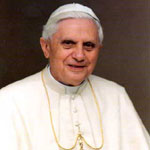video
Pope Benedict on Prayer 7: The Psalms: The Book of Prayer Par Excellence
THE PSALMS: THE BOOK OF PRAYER PAR EXCELLENCE
VATICAN CITY, 22 JUN 2011 (VIS) – Benedict XVI dedicated his catechesis during this morning’s general audience to what he described as “the book of prayer par excellence, the Book of Psalms”. The audience was held in St. Peter’s Square in the presence of 10,000 people.
The 150 Psalms of the Book of Psalms “express all human experience“, said the Pope. “All the truth of the believer comes together in those prayers, which first the People of Israel and later the Church adopted as a special way to mediate their relationship with the one God, and as an adequate response to His having revealed Himself in history“.
“Despite the many forms of expression they contain”, the Psalms “can be divided into two broad categories: … supplication associated with lamentation, and praise. These two dimensions are related, almost indivisible, because supplication is animated by the certainty that God will respond, and this opens the way to praise and thanksgiving; while praise and thanksgiving arise from the experience of salvation received, which presupposes the need for help expressed in the supplication. … Thus, in the prayer of the Psalms, supplication and praise intertwine and fuse together in a single song which celebrates the eternal grace of the Lord as He bows down to our frailty”.
“The Psalms teach us to pray”, the Holy Father explained. “In them, the Word of God becomes the word of prayer. … People who pray the Psalms speak to God with the words of God, addressing Him with the words He Himself taught us. … Through these words it is also possible to know and accept the criteria of His actions, to approach the mystery of His thoughts and His ways, so as to grow and develop in faith and love”.
“By teaching us to pray”, the Pope went on, “the Psalms also teach us that at times of desolation, even
in moments of suffering, the presence of God is a source of wonder and consolation. We may weep, plead and seek intercession, … but in the awareness that we are advancing towards the light, where praise will be unending”.
“Equally important and significant are the manner and frequency in which the words of the Psalms appear in the New Testament, where they assume and underline that prophetic significance suggested by the link of the Book of Psalms with the messianic figure of David. In His earthly life the Lord Jesus prayed with the Psalms, and in Him they reach definitive fulfilment and reveal their fullest and deepest meaning. The prayers of the Book of Psalms, with which we speak to God, speak to us of Him, they speak of the Son, image of the invisible God Who fully reveals the Father’s face to us.
Thus Christians, by praying the Psalms, pray to the Father in Christ and with Christ, seeing those songs in a new perspective which has its ultimate interpretation in the Paschal Mystery”.
Having completed his catechesis and delivered greetings in various languages, the Pope recalled the fact that tomorrow is the Feast of Corpus Christi. He invited everyone in Rome, residents and pilgrims alike, to participate in the Mass he will celebrate at 7 p.m. tomorrow in the basilica of St. John Lateran, and in the subsequent procession along Via Merulana to the basilica of St. Mary Major. “I invite you”, he said, “to join this act of profound faith towards the Eucharist, which represents the most precious treasure of the Church and of humankind”.
AG/ VIS 20110622 (590)
For the Psalms On-Line
The more extensive translation:
ZE11062202 – 2011-06-22
Permalink: http://www.zenit.org/article-32912?l=english
ON LEARNING TO PRAY WITH THE PSALMS
Addressing Him “With the Words That He Himself Gives Us”
VATICAN CITY, JUNE 22, 2011 (Zenit.org).- Here is a translation of the Italian-language catechesis Benedict XVI gave today during the general audience held in St. Peter’s Square. The Pope continued with his series of catecheses on prayer, turning today to a consideration of the Book of Psalms.
* * *
Dear brothers and sisters,
In the preceding catecheses, we paused to consider a number of Old Testament figures who are particularly significant for our reflection on prayer. I spoke about Abraham, who intercedes for the foreign cities; about Jacob, who in his nighttime combat receives a blessing; about Moses, who begs for forgiveness for his people; and about Elijah, who prays for the conversion of Israel. With today’s catechesis, I would like to begin down a new path: Rather than commenting on particular accounts of persons at prayer, we will enter into the “prayerbook” par excellence, the Book of Psalms. In the upcoming catecheses we will read and meditate on a number of the most beautiful psalms which are also dearest to the Church’s tradition of prayer. Today I would like to introduce them by speaking about the Book of Psalms as a whole.
The Psalter presents itself as a “formulary” of prayers, a collection of 150 psalms that the biblical tradition gives to the people of believers in order that they may become their — our prayer — our way of addressing God and of relating to Him. In this book, the whole of human experience with its many facets finds expression, along with the entire range of emotions that accompany man’s existence. In the Psalms, joy and suffering, desire for God and the perception of one’s own unworthiness, delight and the sense of abandonment, trust in God and painful solitude, fullness of life and fear of death are all interwoven and expressed. The believer’s whole reality flows into these prayers, which first the people of Israel and then the Church took up as a privileged meditation on the relationship with the one God, and the fitting response to His self-revelation in history.
As prayer, the Psalms are manifestations of the soul and of faith, in which everyone can recognize himself and in which there is communicated that experience of special closeness to God, to which each man is called. And it is the whole complexity of human existence that converges in the complexity of the different literary forms of the various psalms: hymns, lamentations, individual and collective supplication, songs of thanksgiving, penitential psalms, and other genre that are found in these poetic compositions.
Despite this wide range of expression, two great areas can be identified that synthesize the prayer of the Psalter: petition, which is connected with lament, and praise — two interconnected and almost inseparable dimensions. For petition is animated by the certainty that God will respond, and this opens up to praise and thanksgiving; and praise and thanksgiving flow from the experience of salvation received, which assumes the need for the help expressed by the petition.
In petition, the one who prays laments and describes his situation of distress, of danger, of desolation; or, as in the penitential psalms, he confesses guilt and sin, and asks to be forgiven. He lays bare his neediness before the Lord, in the confidence of being heard, and this implies an acknowledgement of God as good, as desirous of the good, and as the “lover of life” (cf. Wisdom 11:26) who is ready to help, save and forgive. Thus, for example, the Psalmist in Psalm 31 prays: “In thee, O Lord, do I seek refuge; let me never be put to shame [ … ] take me out of the net which is hidden for me, for thou art my refuge (verses 2,5 [1,4]). Therefore, already in the lament something of praise may emerge, announcing itself in the hope of divine intervention, and becoming explicit once divine salvation has become a reality.
In an analogous way — in the psalms of thanksgiving and of praise — in remembering the gift received or in contemplating the greatness of God’s mercy, one recognizes one’s own littleness as well as one’s need for salvation, which is at the foundation of petition. In this way, one confesses to God one’s own condition as a creature, inevitably marked as it is by death, and yet the bearer of a radical desire for life. For this reason, in Psalm 86 the Psalmist exclaims: “I give thanks to thee, o Lord my God, with my whole heart, and I will glorify thy name forever. For great is thy steadfast love toward me; thou hast delivered my soul from the depths of Sheol” (verses 12, 13). In this way, in the prayer of the Psalms, petition and praise are interwoven and blend together into one unique song that celebrates the Lord’s eternal grace that bends down to our frailty.The book of the Psalter was given to Israel and to the Church precisely in order that the people of believers might be permitted to unite themselves to this song. The Psalms, in fact, teach us to pray. In them, the Word of God becomes the word of prayer — and they are the Psalmists’ inspired words — which also become the word of the one who prays the Psalms. This is the beauty and the special nature of this biblical book: Unlike other prayers we find in sacred Scripture, the prayers contained [in the Book of Psalms] are not inserted into a narrative story which specifies either their meaning or their function. The Psalms are given to the believer precisely as a text of prayer, which has as its one end that of becoming the prayer of the one who takes them up and, with them, addresses himself to God. Since they are the Word of God, he who prays the Psalms speaks to God with the very words that God has given to us; he addresses Him with the words that He Himself gives us. Thus, in praying the Psalms we learn to pray. They are a school of prayer.
Something analogous happens when a child begins to talk; when he learns, that is, to express his feelings, emotions, and needs with words that do not belong to him naturally, but which he learns from his parents and from those who live around him. What the child wants to express is his own personal experience, but the means of expression belong to others; and little by little he appropriates them — the words received from his parents become his words, and through those words he also learns a way of thinking and feeling; he enters into a whole world of concepts, and in this [world] he grows, relates with reality, with men and with God. At last, the language of his parents becomes his language; he speaks with the words received from others, which by now have become his words.
And so it is with the prayer of the Psalms. They are given to us so that we might learn to address ourselves to God, to communicate with Him, to talk to Him about ourselves with His words, to find language for an encounter with Him. And, through those words, it will also be possible to know and to receive the standards of his way of acting, to approach the mystery of his thoughts and of his ways (cf. Isaiah 55:8-9), so as to grow always more in faith and love. As our words are not only words, but also teach us about a real and conceptual world, so also these prayers teach us about the heart of God, for which reason are we able not only to speak with God, but also to learn who God is and — in learning how to speak with Him — we learn what is it to be man, to be ourselves.
In this regard, the title given to the Psaltery by the Jewish tradition appears significant. It is called Tehellim, an Hebraic term that means “songs of praise,” [which comes] from the root word we find in the expression “Halleluiah” — literally: “praise the Lord.” Thus, even though this prayerbook is so multifaceted and complex — with its various literary genre and with its connection between praise and petition – it is ultimately a book of praise, that teaches us to give thanks, to celebrate the greatness of the gift of God, to acknowledge the beauty of His words and to glorify His holy Name.
This is the most fitting response before God’s self-revelation, and the experience of His goodness. By teaching us to pray, the Psalms teach us that, even in the midst of desolation, in suffering, God’s presence remains and is the source of wonder and of consolation; we can cry, beg, intercede, lament, but [we do so] in the knowledge that we are walking toward the light, where praise can be definitive; “in thy light do we see light” (Psalm 36:10 [9]).
But beyond the book’s general title, the Jewish tradition has also given specific titles to many of the psalms, attributing them in great part to King David. A figure of notable human and theological depth, David is a complex personality who passed through the most varied experiences fundamental to life. A young shepherd of his father’s flock — passing through the ups and downs and at times dramatic events of life — he becomes king of Israel, the shepherd of God’s people. Although a man of peace, he fought many wars; an untiring and tenacious seeker of God, yet he betrayed His love, and this is characteristic: He always remained a seeker of God, even though he sinned gravely many times; a humble penitent, he received divine forgiveness, even divine pity, and he accepted a fate marked by suffering. Thus, in all his weakness, David was a king “after God’s own heart” (cf. 1 Samuel 13:14); that is, a passionate man of prayer, a man who knew what it meant to petition and to praise. The connection of the Psalms with this illustrious king of Israel is important, then, for he is a messianic figure, the Lord’s Anointed, in whom the mystery of Christ is in some way foreshadowed.Just as important and meaningful are the ways and frequency with which the words of the psalms are repeated in the New Testament, taking up and underscoring the prophetic value suggested by the Psalter’s connection with the messianic figure of David. In the Lord Jesus, who during His earthly life prayed with the Psalms, they find their definitive fulfillment and reveal their fullest and most profound meaning. The prayers of the Psalter, with which we speak to God, speak to us of Him, they speak to us of the Son, the image of the invisible God (Colossians 1:15), who fully reveals to us the Face of the Father. The Christian, therefore, in praying the Psalms, prays to the Father in Christ and with Christ, taking up those songs within a new perspective, which finds its ultimate interpretative key in the Paschal mystery. Thus do the horizons of the one who prays open up to unexpected realities — each Psalm acquires a new light in Christ and the Psalter is able to shine in all its infinite richness.
Dearest brothers and sisters, let us take this holy book in hand; let us allow ourselves to be taught by God to address ourselves to Him; let us make the Psalter a guide that helps us and accompanies us daily along the way of prayer. And let us, like Jesus’ disciples, also ask: “Lord, teach us to pray” (Luke 11:1), opening our hearts to receive the Teacher’s prayer, in which all prayers attain their fulfillment. Thus, made sons in the Son, will we be able to speak to God calling Him “Our Father.” Thank you.
[Translation by Diane Montagna]
Pope Benedict on Prayer 6: through prayer God reveals His saving power
T
THE POWER OF INTERCESSION: THE PROPHET ELIJAH’S PRAYER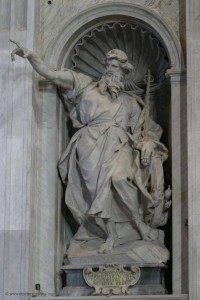
VATICAN CITY, 15 JUN 2011 (VIS) – In his general audience, held this morning in St. Peter’s Square, the Pope resumed his series of catecheses dedicated to the subject of prayer, focusing today on the Prophet Elijah “whom God sent to bring the people to conversion”.
The Holy Father explained how “upon Mount Carmel Elijah revealed himself in all his power as intercessor when, before the whole of Israel, he prayed to the Lord to show Himself and convert people’s hearts. The episode is recounted in chapter 18 of the First Book of Kings”.
“The contest between Elijah and the followers of Baal (which was, in fact, a contest between the Lord of Israel, God of salvation and life, and a mute and ineffective idol which can do nothing for either good or evil) also marked the beginning of a confrontation between two completely different ways to address God and to pray”. The oblations of the prophets of Baal “revealed only the illusory reality of the idol … which closed people in the confines of a desperate search for self”.
On the other hand, Elijah “called on the people to come closer, involving them in his actions and his prayer. … The prophet built an alter using ‘twelve stones, according to the number of the tribes of the sons of Jacob’, … to represent all Israel. … Elijah then addressed the Lord calling Him Lord of the fathers, thus implicitly recalling the divine promises and the history of choice and alliance which had indissolubly united the Lord to His people”.
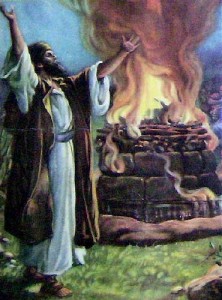 The prophet’s request “was that the people might finally and fully come to know and understand Who their God is, and make the decisive decision to follow only Him. Only in this way could God be recognised as Absolute and Transcendent”. Only in this way would it be clear that “no other gods could be placed at His side, as this would deny His absoluteness and relativize Him”.
The prophet’s request “was that the people might finally and fully come to know and understand Who their God is, and make the decisive decision to follow only Him. Only in this way could God be recognised as Absolute and Transcendent”. Only in this way would it be clear that “no other gods could be placed at His side, as this would deny His absoluteness and relativize Him”.
Benedict XVI highlighted how
“believers must respond to the absoluteness of God with absolute and total love, a love involving all their lives, their energies, their hearts. … In his intercession, Elijah asked of God what God Himself wished to do: to show Himself in all His mercy, faithful to His nature as Lord of life Who forgives, converts and transforms”.
“The Lord responded unequivocally, not only burning the offering but even consuming all the water that had been poured around the altar. Israel could no longer doubt: divine mercy had responded to its weakness, to its doubts, to its lack of faith. Now Baal, the vain idol, was beaten and the people, who seemed lost, had rediscovered the way of truth, they had rediscovered themselves“.
The Holy Father concluded by asking himself what this story has to tell us today.
“Firstly”, he said, “is the priority of the first commandment of God’s Law: having no god but God. When God disappears man falls into slavery, into idolatry, as has happened in our time under totalitarian regimes and with the various forms of nihilism which make man dependent on idols and idolatry, which enslave”. Secondly, he continued, “the main objective of prayer is conversion: the fire of God which transforms our hearts and makes us capable of seeing God and living for Him and for others”. Thirdly, “the Church Fathers tell us that this story is … a foretaste of the future, which is Christ. It is a step on the journey towards Christ”.
AG/ VIS 20110615 (590)
Published by VIS – Holy See Press Office – Wednesday, June 15, 2011
Guidance – it’s all about trust
Welcome to the digital sea….and life in general
Pope Benedict on Prayer 5: “Moses speaks to God as a friend”
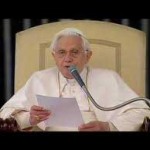 VATICAN CITY, 1 JUN 2011 (VIS) – Benedict XVI dedicated today’s general Wednesday audience catechesis to the figure of Moses who “carried out his function as mediator between God and Israel, making himself the bearer of the divine words and commands for his people, bringing them to the freedom of the Promised Land … and, above all, praying”.
VATICAN CITY, 1 JUN 2011 (VIS) – Benedict XVI dedicated today’s general Wednesday audience catechesis to the figure of Moses who “carried out his function as mediator between God and Israel, making himself the bearer of the divine words and commands for his people, bringing them to the freedom of the Promised Land … and, above all, praying”.
The Pope emphasized that Moses especially acts as intercessor when the people ask Aaron to build the golden calf while they are waiting for the prophet who has ascended Mount Sinai to receive the Tables of the Law. “Tired of following a path with a God who is invisible now that Moses the mediator has also gone, the people demand a tangible, palpable presence of the Lord and find an accessible god, within the reach of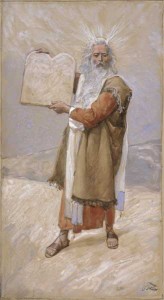 human beings, in Aaron’s molten metal calf. This is a constant temptation on the path of faith: avoiding the divine mystery by building a comprehensible god that corresponds to our own preconceptions and plans”.
human beings, in Aaron’s molten metal calf. This is a constant temptation on the path of faith: avoiding the divine mystery by building a comprehensible god that corresponds to our own preconceptions and plans”.
In the face of the Israelites’ infidelity, God asks Moses to let him destroy that rebel people but Moses understands that those words are directed at him so that the prophet “might intervene and ask him not to do it. … If God were to let his people perish, it could be interpreted as a sign of divine incapacity to fulfill the plan of salvation and God could not allow that: He is the good Lord who salves, the guarantor of life, the God of mercy and forgiveness, of liberation from sin that kills. … Moses had a concrete experience of the God of salvation. He was sent as the mediator of divine liberation and now, with his prayer, he becomes the interpreter of a dual concern, worried for the fate of his people but also worried for the honor due the Lord by the truth of his name. … The love for his brothers and sisters and the love of God are united in his prayer of intercession and are inseparable. Moses, the intercessor, is the man between two loves that, in prayer, are superimpose in one single desire for good”.
 “The intercessor does not make excuses for the sin of his people and does not list the presumed merits of either himself or his people. He appeals to God’s generosity: a free God, completely love, who never ceases to seek those who have drawn away from him. … Moses asks God to show himself even stronger than sin and death and, with his prayer, brings about this divine revelation”.
“The intercessor does not make excuses for the sin of his people and does not list the presumed merits of either himself or his people. He appeals to God’s generosity: a free God, completely love, who never ceases to seek those who have drawn away from him. … Moses asks God to show himself even stronger than sin and death and, with his prayer, brings about this divine revelation”.
“In Moses who is at the top of the mountain – face to face with God, the intercessor of his people – the Fathers of the Church have seen a prefiguration of Christ who, atop the Cross, is truly before God, not just as friend but as Son. … His intercession”, the pontiff concluded, “is not just solidarity but identification with us. … He gives us a forgiveness that transforms and renews. I believe we must meditate on this reality: Christ before God praying for us, identifying with us. From the heights of the Cross he didn’t bring us new stone tablets of the law but himself as Covenant”.
AG/ VIS 20110601 (530)
UPDATED – complete text in English from Vatican.va
BENEDICT XVI
GENERAL AUDIENCE
St. Peter’s Square
Wednesday, 1 June 2011
[Video]
Dear Brothers and Sisters,
As we read the Old Testament we note one figure who stands out from among the others: Moses, precisely, as a man of prayer. Moses, the great prophet and leader at the time of the Exodus, carried out his role as mediator between God and Israel by making himself a messenger to the people of God’s words and divine commands, by leading it towards the freedom of the Promised Land and by teaching the Israelites to live obeying God and trusting in him during their long sojourn in the desert. However, I would say also, and above all, by praying.
Moses prayed for the Pharaoh when God, with the plagues, was endeavouring to convert the Egyptians’ hearts (cf. Ex 8-10); Moses asked the Lord to heal his sister Miriam, afflicted with leprosy (cf. Num 12:9-13); he interceded for the people which had rebelled fearful of what those who had spied out the land would report (cf. Num 14:1-19); he prayed when fire was about to burn down the camp (cf. Num 11:1-2), and when poisonous serpents decimated the people (cf. Num 21:4-9); he addressed the Lord and reacted by protesting when the burden of his mission became too heavy (cf. Num 11:10-15); he saw God and spoke “to him face to face, as a man speaks to his friend” (cf. Ex 24:9-17; 7-23; 34:1-10, 28-35).
And on Sinai, even while the people were asking Aaron to make a golden calf, Moses prayed, explaining with symbols his own role as intercessor. The episode is recounted in chapter 32 of the Book of Exodus and there is a parallel account in chapter 9 of Deuteronomy.
It is this episode on which I would like to reflect in today’s Catechesis and, in particular, on Moses’ prayer which we find in the Exodus narrative. The people of Israel were at the foot of Sinai whereas Moses, on the mountain, was waiting for the gift of the Tables of the Law, fasting for 40 days and 40 nights (cf. Ex 24:18; Dt 9:9). The number 40 has a symbolic value and suggests the totality of the experience, whereas fasting indicates that life comes from God, that it is he who sustains it.
Indeed, the act of eating entails the assumption of the nourishment that keeps us going; hence fasting, giving up all food, in this case acquires a religious significance: it is a way of showing that man does not live by bread alone but by every word that comes from the mouth of the Lord (cf. Deut 8:3). By fasting Moses showed that he was awaiting the gift of the divine Law as a source of life: this Law reveals God’s will and nourishes the human heart, bringing men and women to enter into a covenant with the Most High, who is the source of life, who is life itself.
Yet, while the Lord, on the mountain, was giving the Law to Moses, at the bottom of the mountain the people were violating it. Unable to endure waiting and the absence of their mediator, the Israelites turned to Aaron: “make us gods, who shall go before us; as for this Moses, the man who brought us up out of the land of Egypt, we do not know what has become of him” (Ex 32:11). Weary of the journey with an invisible God, now that Moses, their mediator, had disappeared, the people clamoured for an actual, tangible presence of the Lord, and in the calf of molten metal made by Aaron found a god made accessible, manageable and within human reach.
This is a constant temptation on the journey of faith: to avoid the divine mystery by constructing a comprehensible god who corresponds with one’s own plans, one’s own projects.
What happened on Sinai shows the sheer folly and deceptive vanity of this claim because, as Psalm 106[105] ironically affirms: “they exchanged the glory of God for the image of an ox that eats grass” (v. 20). So it was that the Lord reacted and ordered Moses to come down from the mountain, revealing to him what the people were doing and ending with these words: “now therefore let me alone, that my wrath may burn hot against them and I may consume them; but of you I will make a great nation” (Ex 32:10).
As he had to Abraham with regard to Sodom and Gomorrah, now too God revealed to Moses what his intentions were, almost as though he did not want to act without Moses’ consent (Am 3:7).
He said: “let… my wrath … burn hot”. In fact these words “let… my wrath burn hot” were spoken so that Moses might intervene and ask God not to do it, thereby revealing that what God always wants is salvation.
Just as for the two cities in Abraham’s day, the punishment and destruction — in which God’s anger is expressed as the rejection of evil — demonstrate the gravity of the sin committed; at the same time, the request of the intercessor is intended to show the Lord’s desire for forgiveness. This is God’s salvation which involves mercy, but at the same time also the denunciation of the truth of the sin, of the evil that exists, so that the sinner, having recognized and rejected his sin, may let God forgive and transform him. In this way prayers of intercession make active in the corrupt reality of sinful man divine mercy which finds a voice in the entreaty of the person praying and is made present through him wherever there is a need for salvation.
Moses’ supplication was wholly based on the Lord’s fidelity and grace. He referred first to the history of redemption which God began by bringing Israel out of Egypt and then recalled the ancient promise made to the Fathers. The Lord brought about salvation by freeing his people from slavery in Egypt; so “why”, Moses asked, “should the Egyptians say, ‘With evil intent did he bring them forth, to slay them in the mountains, and to consume them from the face of the earth?’” (Ex 32:12).
Once the work of salvation has been begun it must be brought to completion; were God to let his people perish, this might be interpreted as a sign of God’s inability to bring the project of salvation to completion. God cannot allow this: he is the good Lord who saves, the guarantor of life, he is the God of mercy and forgiveness, of deliverance from sin that kills.
Hence Moses appealed to God, to the interior life of God against the exterior judgement. But, Moses then argued with the Lord, were his Chosen People to perish, even though guilty, God might appear incapable of overcoming sin. And this he could not accept.
Moses had a concrete experience of the God of salvation; he was sent as a mediator of divine liberation and then, with his prayers; he made himself the interpreter of a twofold anxiety; he was worried about his people’s future and at the same time he was also worried about the honour due to the Lord, about the truth of his name. In fact the intercessor wanted the People of Israel to be saved because this people was the flock which had been entrusted to him, but also because it was in this salvation that the true reality of God was manifest.
The prayer of intercession is permeated by love of the brethren and love of God, they are inseparable. Moses, the intercessor, is the man torn between two loves that overlap in prayer in a single desire for good.
Moses then appealed to God’s faithfulness, reminding him of his promises: “Remember Abraham, Isaac, and Israel, your servants, to whom you swore by your own self, and said… ‘I will multiply your descendants as the stars of heaven, and all this land [of which I have spoken] I will give to your descendants, and they shall inherit it for ever” (Ex 32:13). Moses recalls the founding story of the origins, of the Fathers of the people and of their being totally freely chosen, a choice in which God alone took the initiative. Not for their own merits did they receive the promise, but because of God’s free choice and his love (cf. Deut 10:15).
And Moses then asked the Lord to continue in fidelity his record of choosing and salvation, by forgiving his people. The intercessor did not ask for his people to be excused of their sin, he did not list any presumed merits, either the people’s or his own, but appealed to God’s bounty: a free God, total love, who does not cease to seek out those who have fallen away, who is always faithful to himself, who offers the sinner a chance to return to him and, through forgiveness, to become righteous and capable of fidelity. Moses asked God to show himself more powerful than sin and death, and with his prayer elicited this divine revelation of himself.
As a mediator of life, the intercessor showed solidarity with the people: anxious solely for the salvation that God himself desires, he gave up the prospect of it becoming a new people pleasing to the Lord. The sentence that God had addressed to him, “of you I will make a great nation”, was not even taken into consideration by the “friend” of God, who, instead, was ready to take upon himself not only the guilt of his people, but also all its consequences.
When, after the destruction of the golden calf, he returned to the mountain to ask salvation for Israel once again, he was to say to the Lord: “But now, if you will, forgive their sin — and if not, blot me, I pray you, out of your book which you have written” (Ex 32:32).
With prayer, wanting what God wanted, the intercessor entered more and more deeply into knowledge of the Lord and of his mercy, and became capable of a love that extended even to the total gift of himself. In Moses, on the summit of the mountain face to face with God, who made himself an intercessor for his people and offered himself — “blot me out” — the Fathers of the Church saw a prefiguration of Christ who from the very top of the Cross was truly before God, not only as a friend but as Son. And not only did he offer himself — “blot me out” — but with his pierced heart he had himself blotted out, he himself became sin, as St Paul himself says, he tookupon himself our sins to ensure our salvation. His intercession was not only solidarity but identification with us: he bears all of us in his Body. And thus his whole life as a man and as Son is a cry to God’s heart, it is forgiveness, but forgiveness that transforms and renews.
I think we should meditate upon this reality. Christ stands before God and is praying for me. His prayer on the Cross is contemporary with all human beings, contemporary with me. He prays for me, he suffered and suffers for me, he identified himself with me, taking our body and the human soul. And he asks us to enter this identity of his, making ourselves one body, one spirit with him because from the summit of the Cross he brought not new laws, tablets of stone, but himself, his Body and his Blood, as the New Covenant. Thus he brings us kinship with him, he makes us one body with him, identifies us with him. He invites us to enter into this identification, to be united with him in our wish to be one body, one spirit with him. Let us pray the Lord that this identification may transform and renew us, because forgiveness is renewal and transformation.
I would like to end this Catechesis with the Apostle Paul’s words to the Christians of Rome: “Who shall bring any charge against God’s elect? It is God who justifies; who is to condemn? It is Christ Jesus, who died, yes, who was raised from the dead, who is at the right hand of God, who indeed intercedes for us. Who shall separate us from the love of Christ?… neither death, nor life, nor angels, nor principalities… nor anything else in all creation, will be able to separate us from the love of God, [which is] in Christ Jesus our Lord” (Rom 8:33-35, 38, 39).
The Solemnity of the Ascension of the Lord
O Lord,
Your Ascension into heaven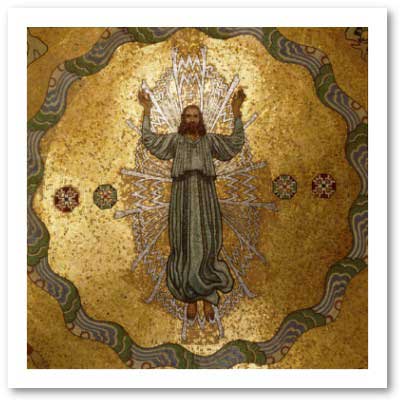
marks the culmination of the Paschal Mystery,
and it contains an important teaching for us.
May we live life as an earthly reality
and develop our human potential to the fullest.
May we make use of the results of science
to achieve a better life on this planet.
But in our best moments
we know that there must be more
than all of this,
a transcending Reality.
As Christians, we know that this Reality
is Your loving Father
Who awaits us with You and the Holy Spirit.
Where You have gone,
we ultimately will come – if we are faithful.
New Saint Joseph People’s Prayer Book

